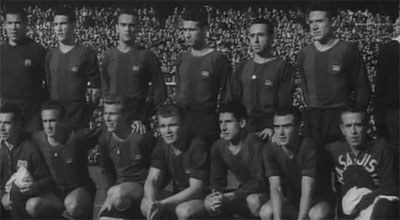FC Barcelona

|
| FC Barcelona in 1953.. |
FC Barcelona — History, Identity & The Legacy of “Més que un club”
Origins — Joan Gamper & The Birth of Barça (1899)
FC Barcelona was founded in 1899 by Swiss football pioneer Joan Gamper. A small group of enthusiasts answered one of Gamper’s newspaper ads, leading to the creation of a club that would grow into one of the most powerful symbols of Catalan culture. Barça quickly became a hub of identity, pride, and football innovation in the region.
Catalan Identity — “Més que un club”
During the early 20th century, Barcelona became a symbol of Catalan freedom and unity. Their motto, “Més que un club”, reflects more than football — it represents language, culture, political resistance, and community strength in Catalonia. FC Barcelona is inseparable from the identity of its people.
Les Corts & Camp de Les Corts Era (1922–1957)
Before the modern Camp Nou, Barça played at Camp de Les Corts, a stadium that witnessed early trophies, growth in fan culture, and political repression during the Franco era. Despite numerous challenges, Barça stood strong as a symbol of Catalan expression.
The Arrival of Kubala — The First Superstar
In the 1950s, Barcelona reached new heights with László Kubala, one of the greatest players of all time. His elegance, power, and creativity helped the club dominate domestic competitions, attracting massive crowds and elevating Barça’s status to an international level.
Camp Nou — The Temple of Football (1957–Present)
In 1957, FC Barcelona inaugurated Camp Nou, the largest stadium in Europe. It became the home of historic nights, greatest players, El Clásico battles, and unforgettable Champions League matches. Camp Nou represents the soul of Barcelona, where football, culture, and emotion blend together.
Cruyff — The Football Revolution (1973–1996)
The arrival of Johan Cruyff as a player in 1973 and later as a coach in 1988 changed Barcelona forever. Cruyff introduced Total Football, ball possession philosophy, and the foundations that shaped modern Barça. His legendary “Dream Team” won the club’s first European Cup in 1992.
La Masia — The Greatest Academy in Football
No academy in the world compares to La Masia.
It produced legends like:
• Messi
• Xavi
• Iniesta
• Busquets
• Puyol
• Pedro
• Fàbregas
La Masia’s philosophy is simple: technical perfection, intelligence, and understanding of Barça’s DNA.
Guardiola Era — The Greatest Football Team in History (2008–2012)
Under Pep Guardiola, Barcelona created the most beautiful football ever seen. Tiki-taka, intense pressing, positional play, and La Masia graduates transformed football forever.
Major achievements:
• Treble in 2009
• 6 trophies in 2009 (Sextuple)
• UEFA Champions League 2009 & 2011
The trio of Xavi–Iniesta–Messi became the greatest midfield connection of all time.
The MSN Era — Messi, Suárez & Neymar (2014–2017)
Barcelona returned to glory with the unstoppable trio Messi–Suárez–Neymar. Their chemistry, creativity, speed, and scoring made them one of football’s deadliest attacking lines.
Achievements include:
• Treble in 2015
• Historic 6–1 comeback vs PSG in 2017 (La Remontada)
Modern Era — Transition, Young Talent & Future Hope
Post-Messi Barcelona entered a challenging transition, balancing financial struggles with rebuilding. New generations such as Pedri, Gavi, Ansu Fati, Lamine Yamal, Araújo are shaping the future of a club built on youth and identity. Despite ups and downs, Barça’s essence remains intact: attacking football, academy excellence, and Catalan pride.

Barça’s crest combines the Catalan flag, St. George’s cross, and blaugrana stripes — representing identity, culture, and football beauty.
